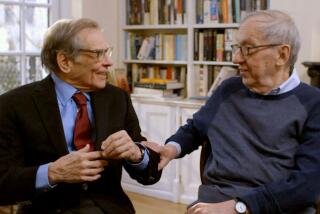Frederick R. Karl, 77; Wrote Reference Works, Biographies
- Share via
Frederick R. Karl, a literary scholar known for his mammoth biographies of William Faulkner, Joseph Conrad and other figures, died of kidney disease April 30 in New York City. He was 77.
Karl, a professor emeritus of both City College of New York and New York University, wrote or edited more than a dozen books, including major reference volumes on modern English and American fiction and a novel set during World War II.
His work as a biographer prone to exhaustive scholarship garnered the most attention, however, particularly his study of Conrad, whose life and writings consumed much of Karl’s career.
“Joseph Conrad: The Three Lives,” published in 1979, totaled 1,008 pages and employed a novelistic treatment. Karl told Publishers Weekly that his goal was to disguise the research that went into the book about the Polish-born author of “Lord Jim” and “Heart of Darkness” in an effort to make it “a reading experience rather than a scholarly experience.”
His creative approach provoked a wide range of critical reaction. The Los Angeles Times’ Robert Kirsch called the book a meticulous and detailed work that was “likely to be the standard biography as to the facts of Conrad’s life.” But Newsweek’s Walter Clemons pronounced it “this thousand-page turkey,” in part because Karl dispensed with chronology to move backward and forward in Conrad’s life. “Karl has decided to compete with Conrad in telling nothing simply,” Clemons wrote.
Much of the book was based on Conrad’s correspondence, which Karl began examining as a graduate student at Columbia University in the 1950s. He negotiated publication rights with the Conrad estate and would later edit, with Laurence Davies, a multi-volume collection of Conrad’s letters for Cambridge University Press.
Karl corresponded with more than 2,000 Conrad collectors, scholars and librarians to compile “The Collected Letters of Joseph Conrad,” the first volume of which was published in 1983 and included letters from such illustrious correspondents as Henry James and Stephen Crane. The seventh volume is nearing publication.
His next major biography was “William Faulkner: American Writer,” published in 1989. Some reviewers faulted the 1,131-page book for engaging in excessive speculation and pop psychologizing about the Nobel Prize-winning novelist, whose problems with women, money and drinking were legendary. Molly Giles, writing in the L.A. Times, found the book too glib, “nasty” and imbued with “a humorless moral outrage” to offer much illumination about such a complex and gifted figure. Yet other critics were laudatory. Louis D. Rubin Jr. of the Washington Post called the work “a brilliant portrait ... of the inner life of our most illustrious 20th-century American writer.”
Karl next tackled Franz Kafka of “Metamorphosis” fame. D. M. Thomas gave it a mixed review in The Times, writing that Karl, in presenting Kafka as “the Everyman of the first half of our century,” argued the case “more exhaustively and persuasively” than other biographers had. Among the book’s flaws, according to Thomas, were its convoluted structure and failure to provide the reader with a clear sense of what Kafka the man was like.
Karl’s other books included “A Reader’s Guide to Great 20th-Century Novels” (1959), which covered Conrad’s work as well as the writings of D.H. Lawrence, E.M. Forster and Virginia Woolf; “American Fictions: 1940-1980: A Comprehensive History and Critical Evaluation” (1984), which appraised the works of such writers as Ralph Ellison, Saul Bellow, J.D. Salinger and William Burroughs; and his fourth major biography, “George Eliot: Voice of a Century” (1995).
Karl taught in the English department at City College of New York for 25 years ending in 1982, when he joined the faculty of New York University. He retired from teaching in 2000 but continued to write on the biographer’s art and other subjects.
He is survived by his wife, Dolores, of East Hampton, N.Y.; three daughters; a sister; and five grandchildren.
More to Read
Sign up for our Book Club newsletter
Get the latest news, events and more from the Los Angeles Times Book Club, and help us get L.A. reading and talking.
You may occasionally receive promotional content from the Los Angeles Times.









